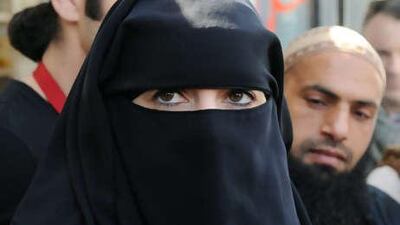PARIS // France's lower house of parliament has approved a ban on burqa-like Islamic veils, a move that is popular among French voters despite serious concerns from Muslim groups and human rights advocates. There were 336 votes for the bill and just one against at the National Assembly. Most members of the main opposition group, the Socialist Party, refused to participate in the vote.
Following the vote, the ban on face-covering veils will go in September to the Senate, where it also is likely to pass. Its biggest hurdle will likely come after that, when France's constitutional watchdog scrutinizes it. The main body representing French Muslims says face-covering veils are not required by Islam, and it worries that the law will stigmatize all Muslims. Amnesty International quickly condemned the vote saying it violated the rights to freedom of expression and religion. The London-based human rights group had written to all French parliamentarians urging them to reject the bill. "A complete ban on the covering of the face would violate the rights to freedom of expression and religion of those women who wear the burqa or the niqab as an expression of their identity or beliefs," said John Dalhuisen, Amnesty's expert on discrimination in Europe. "As a general rule, the rights to freedom of religion and expression entail that all people should be free to choose what - and what not - to wear. "These rights cannot be restricted simply because some - even a majority - find a form of dress objectionable or offensive." A ban could mean women who wear full-face veils could become confined to their homes, less able to work, he said. "Governments should instead be looking to strengthen efforts to combat the discrimination faced by Muslim women, both in their communities and in the broader societies in which they live," Mr Dalhuisen said. "Legitimate security concerns can be met by targeted restrictions on the complete covering of the face in well-defined high risk locations." * Agencies

